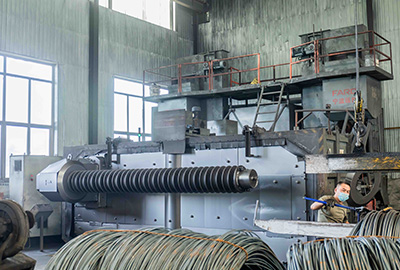stud bolt machine manufacturers
Dec . 07, 2024 16:01 Back to list
stud bolt machine manufacturers
The Evolution and Impact of Stud Bolt Machine Manufacturers
In the realm of industrial manufacturing, the production of fasteners, particularly stud bolts, plays a critical role in numerous applications across various sectors. As industries continue to evolve, the demand for high-quality stud bolts has surged. This rise in demand has led to the flourishing of stud bolt machine manufacturers, which have become pivotal in ensuring that the production processes meet stringent quality and efficiency standards.
Understanding Stud Bolts
Stud bolts are specialized fasteners used in conjunction with nuts to create a secure connection between two components. They are commonly found in applications involving high pressure and temperature, such as in the oil and gas sector, power generation, and heavy machinery. The reliability of these fasteners is paramount, as failures can lead to catastrophic results, including leaks, equipment damage, and safety hazards.
Given their critical function, the manufacturing process of stud bolts must adhere to high precision and rigorous quality checks. This is where stud bolt machine manufacturers come into play.
The Role of Stud Bolt Machine Manufacturers
Stud bolt machine manufacturers design and produce a wide array of machinery and tools necessary for the efficient production of stud bolts. This includes threading machines, forging equipment, and CNC (Computer Numerical Control) machines, which allow for greater precision and automation in the manufacturing process.
1. Innovation in Manufacturing Technology
With advancements in technology, stud bolt machine manufacturers have embraced automation and digitalization. The advent of CNC technology has revolutionized the way fasteners are produced. These machines can perform complex cutting, drilling, and threading processes with minimal human intervention, significantly reducing production time and error rates. This technological shift not only enhances productivity but also ensures a higher level of consistency in the quality of the produced fasteners.
stud bolt machine manufacturers

2. Quality Assurance Protocols
Manufacturers are increasingly adopting stringent quality assurance protocols to meet industry standards such as ASTM (American Society for Testing and Materials) and ISO (International Organization for Standardization). This includes implementing advanced testing methodologies, such as non-destructive testing and material composition analysis. As a result, customers can be assured that the stud bolts produced meet the required specifications for their specific applications.
3. Customization and Flexibility
In addition to general production, leading stud bolt machine manufacturers provide customization options to cater to specific client needs. Industries often require studs in various materials, sizes, and designs depending on their applications. A flexible production setup allows manufacturers to adapt quickly to changing market demands and unique customer specifications, thereby enhancing their competitiveness in the market.
Market Trends and Challenges
The stud bolt manufacturing industry has witnessed significant growth, influenced by the expansion of sectors such as construction, automotive, and renewable energy. However, manufacturers must navigate several challenges. The rising cost of raw materials, coupled with supply chain disruptions, can impact production costs and timelines. Moreover, increasing environmental regulations mandate the adoption of sustainable practices, pushing manufacturers to explore eco-friendly production methods.
The Future of Stud Bolt Machine Manufacturing
Looking ahead, the future of stud bolt machine manufacturers appears promising yet challenging. The integration of smart factory concepts, featuring interconnected machinery and data analytics, is set to redefine manufacturing efficiency. Additionally, as industries place greater emphasis on sustainability, investing in green technologies and practices will be essential for manufacturers to remain relevant.
In summary, stud bolt machine manufacturers hold a vital position in the industrial manufacturing ecosystem. Their ability to innovate, ensure quality, and adapt to market demands plays a crucial role in the continued reliance on stud bolts across various sectors. As technology advances and industries evolve, these manufacturers will be at the forefront, shaping the future of fastener production and driving advancements in the broader manufacturing landscape.
Latest news
-
High-Quality Panel Stud Bolt Reliable Panel Stud Bolt Factory & Suppliers
NewsJul.08,2025
-
High-Precision Fine Thread Locknuts Manufacturer & Supplier Custom Solutions
NewsJul.08,2025
-
PH Imperial Stud Bolt – High Strength Fasteners from Leading Supplier & Factory
NewsJul.07,2025
-
High-Quality Allen Wrench Bolts Leading Factory, Company & Suppliers
NewsJul.07,2025
-
Wholesale Ball Stud Bolt - High Quality Supplier & Factory Price Reliable Wholesale Ball Stud Bolt Company
NewsJul.06,2025
-
High-Strength Alloy Bolts Manufacturer & Supplier Quality Alloy Fasteners Factory
NewsJul.06,2025
